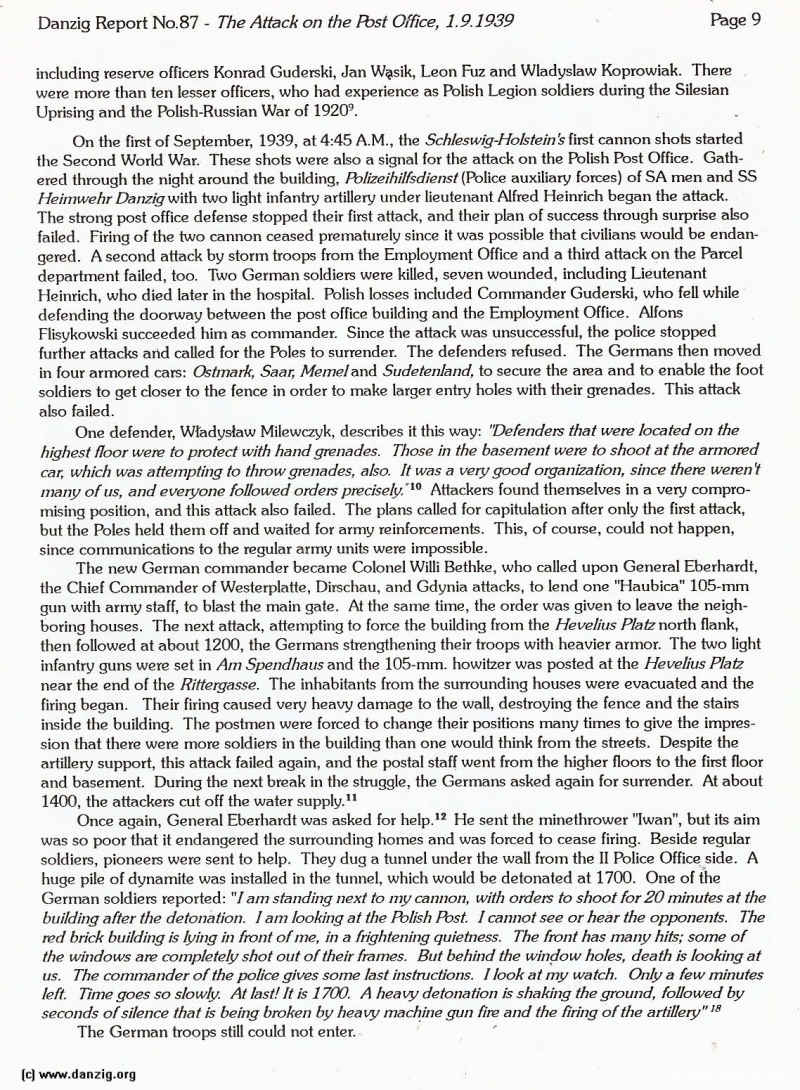
> The Attack on the Post Office
including reserve officers Konrad Guderski, Jan Wsik, Leon Fuz and Wladyslaw Koprowiak. There were more than ten lesser officers, who had experience as Polish Legion soldiers during the Silesian Uprising and the Polish-Russian War of 192O.
On the first of September, 1939, at 4:45 A.M., the Schleswig-Holstein first cannon shots started the Second World War. These shots were also a signal for the attack on the Polish Post Office. Gathe red through the night around the building, Polizeihilfsdienst (Police auxiliary forces) of SA men and SS Heimwehr Danzig with two Light infantry artillery under lieutenant Alfred Heinrich began the attack. The strong post office defense stopped their first attack, and their plan of success through surprise also failed. Firing of the two cannon ceased prematurely since it was possible that civilians would be endang ered. A second attack by storm troops from the Employment Office and a third attack on the Parcel department failed, too. Two German soldiers were killed, seven wounded, including Lieutenant Heinrich, who died later in the hospital. Polish losses included Commander Guderski, who fell while defending the doorway between the post office building and the Employment Office. Alfons Flisykowski succeeded him as commander. Since the attack was unsuccessful, the police stopped further attacks and called for the Poles to surrender. The defenders refused. The Germans then moved in four armored cars: Ost mark, Saar, Memel and Sudetenland, to secure the area and to enable the foot soldiers to get closer to the fence in order to make larger entry holes with their grenades. This attack also failed.
One defender, Wladyslaw Milewczyk, describes it this way: “Defenders that were located on the highest floor were to protect with hand grenades. Those in the basement were to shoot at the armored car, which was attempting to throw grenades, also. It was a very good organization, since there weren’t many of us, and everyone followed orders precisely.’° Attackers found themselves in a very compromising position, and this attack also failed. The plans called for capitulation after only the first attack, but the Poles held them off and waited for army reinforcements. This, of course, could not happen, since communications to the regular army units were impossible.
The new German commander became Colonel Will Bethke, who called upon General Eberhardt, the Chief Commander of Westerplatte, Dirschau, and Gdynia attacks, to lend one “Haubica” 105-mm gun with army staff, to blast the main gate. At the same time, the order was given to leave the neighboring houses. The next attack, attempting to force the building from the Hevelius Platz north flank, then followed at about 1200, the Germans strengthening their troops with heavier armor. The Iwo light infantry guns were set in Am Spendhaus and the 105-mm. howitzer was posted at the Hevelius Platz near the end of the Rittergasse. The inhabitants from the surrounding houses were evacuated and the firing began. Their firing caused very heavy damage to the wall, destroying the fence and the stairs inside the building. The postmen were forced to change their positions many times to give the impress ion that there were more soldiers in the building than one would think from the streets. Despite the artillery support, this attack failed again, and the postal staff went from the higher floors to the first floor and basement. During the next break in the struggle, the Germans asked again for surrender. At about 14.00, the attackers cut off the water supply.”
Once again, General Eberhardt was asked for help. He sent the minethrower “Iwan”, but its aim was so poor that it endangered the surrounding homes and was forced to cease firing. Beside regular soldiers, pioneers were sent to help. They dug a tunnel under the wall from the II Police Office side. A huge pile of dynamite was installed in the tunnel, which would be detonated at 17.00. One of the German soldiers reported: “fain standing next to my cannon, with orders to shoot for 20 minutes at the building after the detonation. fain looking at the Polish Post. I cannot see or hear the opponents. The red brick building is lying in front of me, in a fritening quietness. The front has many hits; some of the windows are completely shot out of their frames. But behind the window holes, death is looking at us. The commander of the police gives some last instivctIons. hook at my watch. Only a few minutes left. Time goes so slowly. At last! It is 1700. A heavy detonation is shaking the ground, followed by seconds of silence that is being broken by heavy machine gun fire amid the firing of the artillery”8 The German troops still could not enter.
Danzig Report Nr. 87 - April - May - June - 1995, Page 9.
Hits: 4905
Added: 11/07/2015
Copyright: 2026 Danzig.org

